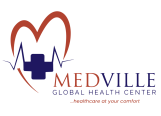Your Heart, Your Lifeline!
Introduction
Your heart is the engine that keeps your body running, and just like any engine, it needs proper care to function efficiently. Heart disease is one of the leading causes of death worldwide, but the good news is that most heart-related issues are preventable with healthy lifestyle choices.
At MedVille Global Health Center, our cardiology experts emphasize the importance of proactive heart care. In this blog post, we share practical tips to help you strengthen your heart, reduce your risk of heart disease, and enjoy a healthier, longer life.
1. Eat a Heart-Healthy Diet
Your diet plays a major role in your heart health. Consuming the right foods can help lower blood pressure, cholesterol levels, and inflammation, all of which contribute to heart disease.
💚 Best foods for your heart:
✔️ Leafy greens (spinach, kale) – rich in vitamins and antioxidants
✔️ Whole grains (brown rice, oats) – help regulate blood sugar and cholesterol
✔️ Fatty fish (salmon, tuna) – loaded with heart-healthy omega-3 fatty acids
✔️ Nuts (almonds, walnuts) – contain healthy fats and fiber
✔️ Berries (blueberries, strawberries) – reduce oxidative stress and inflammation
🚫 Foods to avoid:
❌ Processed foods high in sodium and unhealthy fats
❌ Sugary drinks and excessive sweets
❌ Red and processed meats
❌ Fried and fast foods
2. Stay Physically Active
Regular exercise strengthens your heart muscle and improves circulation. It also helps control weight, blood pressure, and cholesterol levels.
🏃♂️ Best heart-friendly exercises:
✔️ Aerobic activities (brisk walking, cycling, swimming) – at least 150 minutes per week
✔️ Strength training (lifting weights, resistance bands) – at least twice a week
✔️ Stretching & flexibility exercises (yoga, pilates) – to improve blood flow and reduce stress
💡 Tip: If you have a busy schedule, start with 10-minute walks daily and gradually increase your activity level.
3. Manage Stress Effectively
Chronic stress contributes to high blood pressure and heart disease. Managing stress properly can protect your heart.
🧘 Effective stress management techniques:
✔️ Deep breathing and meditation
✔️ Regular physical activity
✔️ Quality sleep (7–9 hours per night)
✔️ Connecting with loved ones
✔️ Reducing screen time and practicing mindfulness
💡 Tip: Avoid overloading your schedule. Take short breaks during the day and engage in activities that relax you.
4. Maintain a Healthy Weight
Being overweight or obese increases the risk of heart disease. Excess weight puts strain on the heart, leading to high blood pressure and cholesterol problems.
💡 Tips for weight management:
✔️ Eat balanced meals with portion control
✔️ Stay active with at least 30 minutes of movement daily
✔️ Drink plenty of water and avoid sugary drinks
✔️ Get professional advice if needed – a nutritionist or cardiologist can help
5. Monitor Your Blood Pressure & Cholesterol Levels
High blood pressure and high cholesterol are silent killers because they often show no symptoms until serious damage is done.
🩺 How to stay on track:
✔️ Get your blood pressure checked regularly (at least once a year)
✔️ Monitor cholesterol levels with a simple blood test
✔️ Reduce salt and processed foods to keep blood pressure in check
✔️ Follow your doctor’s recommendations if you’re on medication for hypertension or cholesterol
💡 Tip: If you have a family history of heart disease, discuss preventive screenings with your doctor early.
6. Avoid Smoking & Limit Alcohol Intake
🚭 Smoking damages blood vessels and increases the risk of heart attacks and strokes. Quitting smoking is one of the best things you can do for your heart health.
🍷 Excessive alcohol consumption can also raise blood pressure and cholesterol levels. Stick to moderate drinking (one drink per day for women, two for men) or avoid it completely.
7. Get Regular Health Checkups
Routine checkups help detect heart-related issues early before they become severe.
📌 Important heart health tests:
✔️ Blood pressure checks
✔️ Cholesterol and triglyceride tests
✔️ Blood sugar tests (for diabetes screening)
✔️ ECG (Electrocardiogram) to assess heart rhythm
✔️ Stress tests for cardiovascular performance
💡 Tip: Visit your doctor at least once a year for a comprehensive heart health assessment.
Conclusion: Protect Your Heart, Live Longer
Your heart works 24/7 to keep you alive—so take good care of it! By following these expert tips, you can lower your risk of heart disease and enjoy a longer, healthier life.
At MedVille Global Health Center, our cardiology team is dedicated to providing the best care to help you maintain a strong and healthy heart.
📌 Schedule your heart checkup today! Your heart deserves it.
📖 Read more in our latest blog post: https://medvilleglobal.com/blog/



